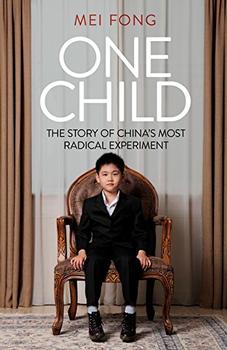Summary | Excerpt | Reading Guide | Reviews | Readalikes | Genres & Themes | Author Bio

The Story of China's Most Radical Experiment
by Mei FongPrologue
In the midst of the Cold War, China's rocket scientists came up with an ambitious plan that had nothing to do with missiles, or space exploration, or weaponry of any kind.
It concerned babies.
On September 25, 1980, China's Communist Party unveiled this plan through an open letter that asked members to voluntarily limit their family size to one child. The request was, in truth, an order.
Thus began the one-child policy, the world's most radical social experiment, which continues to irrevocably shape how one in six people in this world are born, live, and die.
Like crash dieting, the one-child policy was begun for reasons that had merit. China's leadership argued the policy was a necessary step in its Herculean efforts to lift a population the size of the United States' from abject poverty. But like crash dieting, the one-child policy employed radical means and aimed for quick results, causing a rash of negative side effects.
The excesses of the one-child policy, such as forced sterilizations and abortions, would eventually meet with global opprobrium. Balanced against this, however, is the world's grudging admiration for China's soaring economic growth, a success partially credited to the one-child policy.
What we fail to understand is that China's rapid economic growth has had little to do with its population-planning curbs. Indeed, the policy is imperiling future growth because it is rapidly creating a population that is too old, too male, and, quite possibly, too few.
More people, not less, was one of the reasons for China's boom. The country's rise as a manufacturing powerhouse could not have happened without abundant cheap labor from workers born during the 1960s–70s baby boom, before the one-child policy was conceived.
To be sure, fewer births made investments in human capital more efficient—less spreading out of educational resources, for example. Many economists, however, agree that China's rapid economic rise had more to do with Beijing's moves to encourage foreign investment and private entrepreneurship than a quota on babies. Privatizing China's lumbering state-owned enterprises, for example, spurred private-sector growth until it accounted for as much as 70 percent of China's gross domestic product (GDP) by 2005. Arthur Kroeber, one of the most prolific and respected economists who specializes in China, said, "Let's say China grew 10%; I would be surprised if more than 0.1% of this is due to the one-child policy."
China's vast cohort of workers is growing old. By 2050, one out of every four people in China will be over sixty-five. And the one-child policy has vastly shrunk the working population that must support and succor this aging army. In recent years China has made great strides in rolling out nationwide pension and health-care schemes, but the social safety net is far from adequate, and the leadership will have to do much more with much less time.
I started reporting on China's economic miracle in 2003 as a Wall Street Journal correspondent. I was on the factory beat, covering the workshop of the world. Every little city in southern China's Pearl River Delta defined itself by what it made: I made regular stops at Jeans City, Bra Town, and Dollar Store center, wrote stories about the world's largest Christmas tree factory, and about a brassiere laboratory that birthed the Wonderbra.
Few envisioned a worker shortage then. But I was starting to hear stories about factory owners being forced to hike wages. Some resorted to offering previously unheard-of perks like TVs, badminton courts, and free condoms. Most economists at the time saw it as a short-term labor supply issue that would soon sort itself out. For how could you run out of workers in China?
As it turned out, the work force shrinkage happened faster than anticipated. The one-child policy sharply accelerated a drop in fertility. China's massive 800-million-person work force—larger than Europe's population—started to contract in 2012 and will continue doing so for years to come, driving up wages and contributing to global inflationary pressures.
Excerpted from One Child by Mei Fong. Copyright © 2016 by Mei Fong. Excerpted by permission of Houghton Mifflin Harcourt. All rights reserved. No part of this excerpt may be reproduced or reprinted without permission in writing from the publisher.




Fanaticism consists in redoubling your effort when you have forgotten your aim
Click Here to find out who said this, as well as discovering other famous literary quotes!
Your guide toexceptional books
BookBrowse seeks out and recommends the best in contemporary fiction and nonfiction—books that not only engage and entertain but also deepen our understanding of ourselves and the world around us.